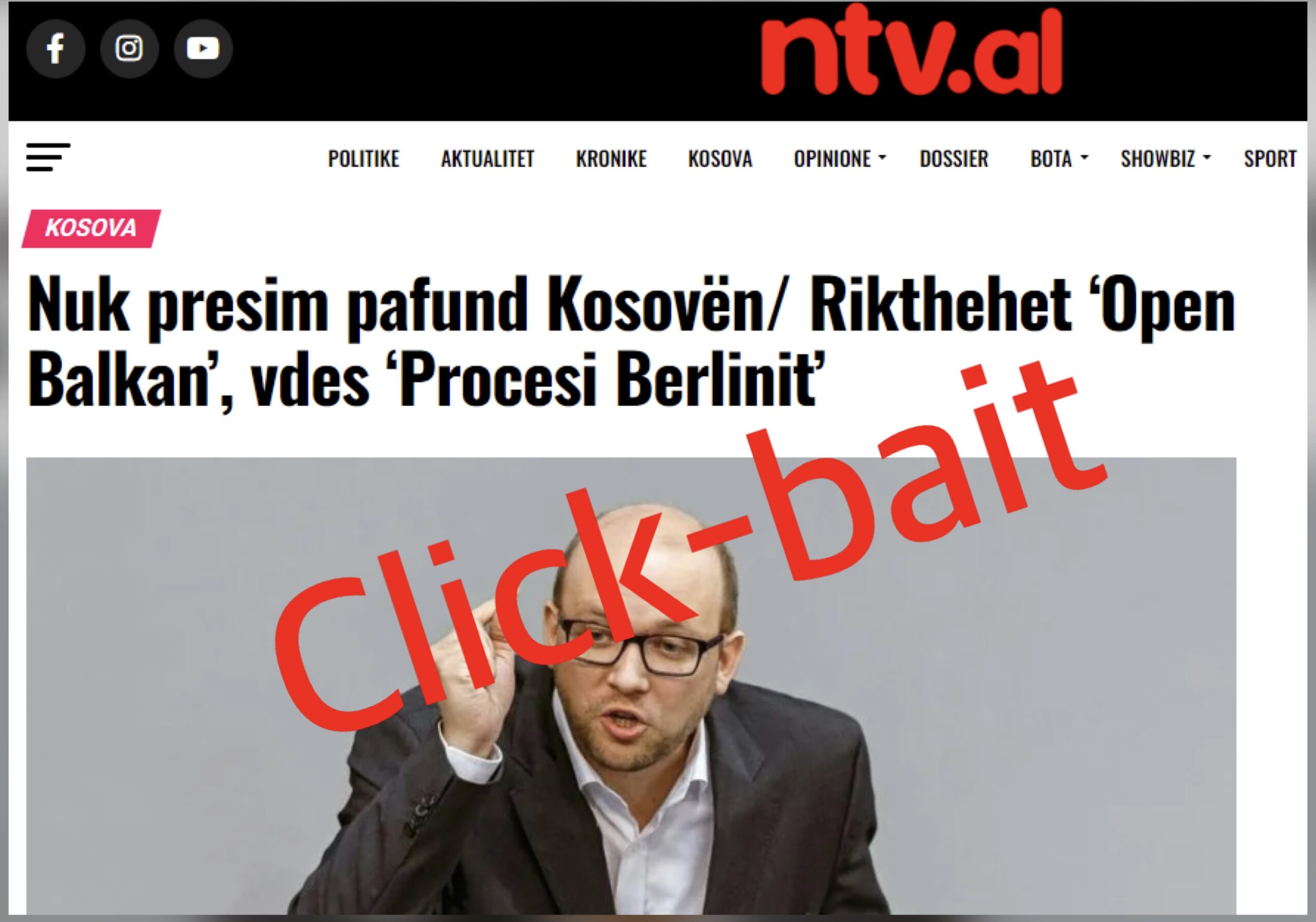On September 16, 2024, the online news outlet NTV.al published an article titled "We Won't Wait Forever for Kosovo/‘Open Balkan’ Returns, ‘Berlin Process’ Dies." The article cites Germany's envoy for the Western Balkans, Manuel Sarrazin, regarding the Berlin Process. However, nowhere in the article is it stated that the initiative, founded to strengthen cooperation among Western Balkan countries, has ended, as the headline claims.
Without providing evidence to support the claim made in the title, such articles fall under the category of "clickbait" with misleading content. The article also fails to provide details about when and where Sarrazin’s statements were made, which are basic elements of journalism. This article was published both on the outlet’s website and on their Facebook page.
Manuel Sarrazin had two visits in Kosovo within just a few days, as part of the preparations for the 10th anniversary of the Berlin Process. During these visits, Sarrazin accused the Government of Kosovo of failing to reach an agreement regarding the Central European Free Trade Agreement (CEFTA). The German envoy urged Kosovo to lift the blockade on Serbian goods but emphasized that in both meetings with Prime Minister Albin Kurti, he received a negative response to his request for a compromise. "We have a fundamental principle in the European Union: you can only block yourself. I need to explain to the Government of Kosovo that we will continue to pursue agreements on these issues, including the shared free market, even without Kosovo if necessary. That is my message," Sarrazin stated.
In June 2023, the Government of Kosovo banned imports from Serbia, citing concerns that they posed a threat to Kosovo's security and could be a channel for smuggling weapons. This decision was made following the arrest of three Kosovar police officers at the border with Serbia. In addition to Sarrazin, other German officials have also warned that Kosovo may be excluded from regional trade initiatives if it continues to insist on the ban of Serbian imports. Kosovo has been a member of CEFTA since 2007, with the agreement initially signed on Kosovo’s behalf by UNMIK. The Central European Free Trade Agreement (CEFTA) was formed in 1992 by Central European countries, Poland, Hungary, the Czech Republic, and Slovakia, to facilitate their procedures for joining the European Union (EU). The CEFTA agreement was founded on the principles of a market economy, with member states believing that further economic development could only be achieved by urging a market economy and healthy competition.
The "Open Balkan" initiative, which the Albanian news outlet falsely claimed was being revived while linking it to the supposed end of the Berlin Process, was launched in 2019 by the leaders of Albania, Serbia, and North Macedonia. However, the other three Western Balkan countries, Kosovo, Montenegro, Bosnia and Herzegovina, did not join. According to its initiators, Open Balkan aims to deepen economic cooperation between the participating countries, increase trade exchanges, and promote freedom of movement. Nevertheless, Kosovo's Prime Minister, Albin Kurti, has argued that this initiative resembles more of an "Open Balkan for Eastern influences" rather than a regional common market. Speaking about Open Balkan, Sarrazin stated that if CEFTA remains blocked, Open Balkan will come into play. "I am certain, 100 percent sure, that if we fail to unblock the CEFTA issue by the Berlin Summit, the next day Open Balkan will become the next challenge for the region," Sarrazin remarked.
The Berlin Process and Open Balkan are two initiatives involving Western Balkan countries, both aiming to promote economic cooperation and freedom of movement. However, European Union and Western Balkans policy experts have pointed out that, although they address similar issues, these initiatives differ in structure and may even conflict with one another. One key difference is the number of countries involved, but experts also note that the Berlin Process operates under the standards set by the ‘acquis communautaire’, the body of EU law, whereas Open Balkan "is not tied" to any EU standards.
*This article is published as part of the Western Balkans Regional Initiative against disinformation. “Western Balkans Anti-Disinformation Hub: exposing malign influences through watchdog journalism.”





























































